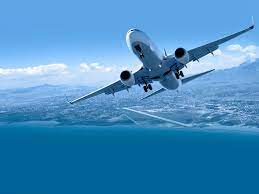
According to an official, Saudi Arabia is aiming for a tenfold rise in foreign airline passengers crossing the country by the end of the decade in order to triple yearly passenger traffic.
The government declared plans last year to become a worldwide transportation and logistics hub by 2030, with a goal of 330 million passengers per year, though few details have emerged.
The plan, which calls for an investment of 500 billion riyals ($133.32 billion), is part of an economic strategy to create jobs and wean the kingdom off oil money.
Saudi Arabia is competing with its neighbour the United Arab Emirates, where airline Emirates' principal business model is transit traffic, as a result of this policy, which has seen the government mandate that corporations move their regional headquarters to the country.
Saudi Arabia's main goal, according to Mohammed Alkhuraisi, head of strategy at the General Authority of Civil Aviation, is to increase the number of visitors to the country.
"We are not after the transit market," he told Reuters.
The government plans to increase direct international flights from 99 to 250, partly to support the kingdom's young tourism industry, but also to help it grow into a major economic hub.
International transit traffic would increase tenfold from roughly 3 million in 2019 to 30 million in 2030, accounting for 10 per cent of Saudi Arabia's yearly passenger flow, up from 3 per cent.
In the year before the pandemic, Emirates carried more than 56 million passengers, while Qatar Airways, which likewise focuses on transiting traffic, flew more over 32 million.
Unlike Saudi Arabia, which has a population of 30 million people, the UAE and Qatar have no domestic aviation markets.
Some analysts believe there is room in the Gulf to compete for transit business, especially now that Etihad Airways of Abu Dhabi has dialled back its goals in recent years.
Others are sceptical, partly because of the global implications of the COVID-19 pandemic, but also because of Etihad's struggles despite its affluent state support.
Saudi Arabia also wants to raise annual air cargo volumes to 4.5 million tonnes by 2030, up from 900,000 tonnes in 2019, with half of it going overseas, according to Alkhuraisi.
Saudi Arabia is establishing a new airline to be based in the capital Riyadh, while the 77-year-old national airline Saudia will be based in the Red Sea city of Jeddah as part of the country's transportation strategy.
Although reports say the new carrier, which is backed by the Public Investment Fund (PIF), would compete with UAE and Qatari carriers, it is unclear when it will begin operations.
Questions about the airline were postponed to the PIF by Alkhuraisi.
(Source:www.reuters.com)
The government declared plans last year to become a worldwide transportation and logistics hub by 2030, with a goal of 330 million passengers per year, though few details have emerged.
The plan, which calls for an investment of 500 billion riyals ($133.32 billion), is part of an economic strategy to create jobs and wean the kingdom off oil money.
Saudi Arabia is competing with its neighbour the United Arab Emirates, where airline Emirates' principal business model is transit traffic, as a result of this policy, which has seen the government mandate that corporations move their regional headquarters to the country.
Saudi Arabia's main goal, according to Mohammed Alkhuraisi, head of strategy at the General Authority of Civil Aviation, is to increase the number of visitors to the country.
"We are not after the transit market," he told Reuters.
The government plans to increase direct international flights from 99 to 250, partly to support the kingdom's young tourism industry, but also to help it grow into a major economic hub.
International transit traffic would increase tenfold from roughly 3 million in 2019 to 30 million in 2030, accounting for 10 per cent of Saudi Arabia's yearly passenger flow, up from 3 per cent.
In the year before the pandemic, Emirates carried more than 56 million passengers, while Qatar Airways, which likewise focuses on transiting traffic, flew more over 32 million.
Unlike Saudi Arabia, which has a population of 30 million people, the UAE and Qatar have no domestic aviation markets.
Some analysts believe there is room in the Gulf to compete for transit business, especially now that Etihad Airways of Abu Dhabi has dialled back its goals in recent years.
Others are sceptical, partly because of the global implications of the COVID-19 pandemic, but also because of Etihad's struggles despite its affluent state support.
Saudi Arabia also wants to raise annual air cargo volumes to 4.5 million tonnes by 2030, up from 900,000 tonnes in 2019, with half of it going overseas, according to Alkhuraisi.
Saudi Arabia is establishing a new airline to be based in the capital Riyadh, while the 77-year-old national airline Saudia will be based in the Red Sea city of Jeddah as part of the country's transportation strategy.
Although reports say the new carrier, which is backed by the Public Investment Fund (PIF), would compete with UAE and Qatari carriers, it is unclear when it will begin operations.
Questions about the airline were postponed to the PIF by Alkhuraisi.
(Source:www.reuters.com)





